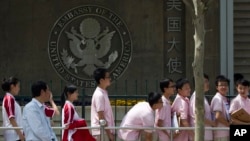Student Union
2020 Sees Higher Education Admissions Scandal, Visa Challenges for International Students
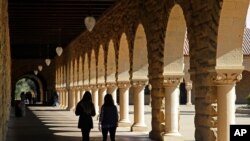
The coronavirus pandemic led to more than 1.7 million deaths and 79 million confirmed cases of COVID-19 — the disease caused by the virus — and international students around the world largely escaped health affects but were disrupted in their studies.
Higher education in the United States also was roiled by a huge admissions scandal and immigration restrictions, which punctuated a chaotic and anxiety-ridden year.
The issues:
College admissions scandal
Nearly three dozen parents, including "Full House" actress Lori Loughlin and her husband, fashion designer Mossimo Giannulli, were sentenced in a high-profile college admissions scandal that revealed wealthy parents buying their children's way into college.
The family of Yusi "Molly" Zhao, who was admitted to the sailing program at Stanford University in 2017, paid to get their daughter into the highly selective school. The family of another student, Sherry Guo, paid $1.2 million to assist in her entry to Yale University in Connecticut.
Another parent, Xiaoning Sui of Surrey, British Columbia, was sentenced to five months and ordered to pay a fine of $250,000 in addition to forfeiting the $400,000 she paid to William "Rick" Singer, who facilitated the admissions arrangements.
Singer pleaded guilty to accepting more than $25 million for connecting parents and their children with test administrators and college coaches.
Staff from several universities were involved in the case, such as Yale, Stanford, Georgetown, University of California Los Angeles and the University of Southern California. But the U.S. Justice Department deemed the schools were unaware of the staff activity and were nonparticipants in the bribery.
China connections
The January arrest of a Harvard professor who is a pioneer in nanoscience shed light on relationships between American brain power, the Chinese government and funding between the two that involves intellectual property theft.
Charles Lieber, head of Harvard University's chemistry department and a world leader in nanoscience, was charged with lying about receiving funding from Chinese research agencies. Lieber was simultaneously receiving research funding from the U.S. Department of Defense and the National Institutes of Health.
The U.S. government alleges that Lieber hid being paid up to $50,000 a month by the Chinese government. He also received more than $1.5 million to create a research lab at Wuhan University of Technology in China, according to court documents.
Lieber denied the allegations and pleaded not guilty to the charges in July.
In 2020, the U.S. pursued several cases against researchers and educators, like Lieber, who had connections with the Chinese government or Chinese companies.
Visa challenges
The Trump administration issued several changes regarding immigration and modifications that affected the stability of student visas throughout the year.
In July, U.S. Immigration and Customs Enforcement (ICE) announced a rule that would require international students in the U.S. to attend some classes in person — not exclusively online — or risk deportation during the pandemic.
ICE rescinded the rule after Harvard University and Massachusetts Institute of Technology filed a lawsuit against the U.S. with signatures of support from more than 200 U.S. universities.
Affirmative action lawsuits
A federal appeals court ruled that Harvard University does not discriminate against Asian American applicants after a group accused the university of imposing a "racial penalty" on Asian Americans.
Harvard University said an applicant's race is only one factor in its "holistic" admissions process and denied any discrimination.
Students for Fair Admissions, a nonprofit that aims to eliminate the use of race in college admissions, filed the lawsuit in 2014, and has failed in other attempts to sue universities on the grounds of unfair admissions.
The youth vote
The youth vote, especially young voters of color, turned out in record numbers to support President-elect Joe Biden and Vice President-elect Kamala Harris in the 2020 presidential elections.
Among the nearly 240 million eligible voters in the U.S., about 20% were 18- to 29-year-olds, and they favored Biden over President Donald Trump by 61% to 36%, according to data from the Center for Information and Research on Civic Learning and Engagement (CIRCLE) at Tufts University in Massachusetts.
Top issues for young voters included COVID-19, health care, race relations and climate change, according to CIRCLE polls. Gun violence and student loan debt were also key issues that swayed their choice to choose the next president.
2020 Open Doors report
New enrollment of international students dropped 43% at the start of the 2020-2021 academic year because of COVID-19, according to an annual report. Nearly 40,000 students — mostly incoming freshmen — deferred enrollment to a future term at 90% of U.S. institutions.
The data were compiled and reported by the Institute for International Education and published in its annual Open Doors report about international students in the U.S. It is funded by the U.S. Department of State, which issues visas to students and visitors participating in educational or vocational training.
NAFSA: Association of International Educators found that the 2019-2020 international enrollment at U.S. colleges and universities accounted for $38.7 billion, a drop of $1.8 billion – a 4.4% decrease – from the previous year.
It was the first time that the dollar amount international students contribute to U.S. colleges and universities dropped in 20 years, NAFSA reported.
The coronavirus pandemic also left U.S. colleges and universities reeling in 2020.
See all News Updates of the Day
- By VOA News
International students discuss US campus culture shock

International students at De Anza College in Cupertino, California, talked about culture shock in an article in La Voz News, the student newspaper.
"It felt like a major culture shock. Everything was so different, from academics to mannerism," said a student from Mexico.
Read the full story here.
These are the most expensive schools in the US
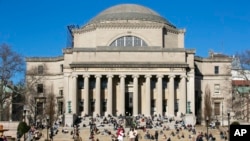
High tuition costs along with housing and food expenses can add up for students at U.S. colleges and universities.
MSNBC looked at the most expensive schools in the country, with one costing more than $500,000 for a bachelor’s degree. (June 2024)
Uzbekistan students admitted into top US universities
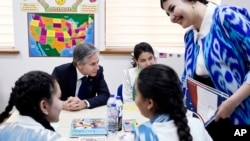
Students from Uzbekistan are among the international students admitted to top colleges and universities in recent years.
Gazata.uz profiled some of the Uzbekistan students attending Harvard, Brown, Princeton and other U.S. universities. (June 2024)
- By Stella Hsu
Reports of visa checks, deportations worry Chinese STEM students in US
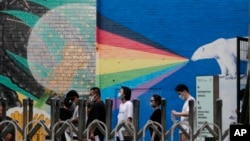
Geopolitical tensions and growing competition in tech between the United States and China appear to be spilling over into academia despite commitments from the world’s two biggest economies to boost people-to-people exchanges.
The United States remains the top choice for Chinese students seeking to study abroad with nearly 300,000 studying in American colleges and universities during the 2022-2023 school year. But reports of some cases that students and professors are facing extra scrutiny while passing through immigration and the deportation of others are raising concerns.
For Chen Xiaojin, a doctoral student studying semiconductor materials at a university in the Washington, D.C., metropolitan area, it has been six years since she returned to her hometown of Beijing.
At first, it was the COVID-19 pandemic that kept her from going home. But over the past two years, she has been deterred by accounts of Chinese students majoring in science and engineering being required to reapply for their visas upon returning to China.
She also says she is worried by reports over the past six months of Chinese students being deported, even at nearby Dulles Airport.
"My current research is relatively sensitive, and my boss [adviser] is getting funds from the U.S. Department of Defense, making it even more sensitive,” she told VOA. "I am afraid that I won't be able to return after I go back [to China]."
Chen says that if she did return to China, she would have to apply for a new visa.
In a report late last month, Bloomberg said it had found at least 20 Chinese students and scholars with valid visas who were deported at U.S. Customs since November and barred from reentry. The U.S. Customs and Border Protection Agency does not release relevant data.
Immigration attorney Dan Berger represented one Chinese student who was deported late last year. He tells VOA Mandarin that the student studied biological sciences at Yale University and was about to complete her doctorate.
She visited her family in China and got a new visa but was deported by customs at Dulles Airport and barred from reentering the country for five years. Berger said he did not see anything suspicious in the transcript of the conversation between the student and the customs officer.
"We have seen what seems like a pattern over the last six months of Chinese PhD students being turned around…. more than I've seen in quite a while," he said.
Matthew Brazil, a fellow at the Jamestown Foundation, said neither country seems willing to explain the situation. However, he believes that in most cases, the United States must have valid reasons for blocking visa holders from entering the country.
In some cases, the student’s background may not match what is written on the visa application. In other cases, customs agents may also find something that the State Department missed, and once they see it, they are responsible for taking action.
"I wish the Chinese side would be specific about their students who were refused entry,” he said. “The fact that both sides are mum on details and that the Chinese side is engaged with the usual angry rhetoric means that each has security concerns. And that says to me that there was good reason for the U.S. to stop these particular applicants."
Brazil also sees a connection between the entry denials and export control regulations issued by the United States in October 2022 that restrict China's ability to obtain advanced computing chips, develop and maintain supercomputers, and manufacture advanced semiconductors.
U.S. Customs and Border Protection is one of the law enforcement agencies authorized to investigate violations of export control regulations, he said.
"Beijing's intelligence agencies are known to focus attention on PRC [People's Republic of China] students and scientists headed abroad who study or work on dual-use technologies controlled under the Export Administration Act — compelling Chinese students and scientists to report on what they've learned when they return to China on holiday,” he said. “This has been true for decades."
Bill Drexel, a fellow for the Technology and National Security Program at the Center for a New American Security, said the U.S. government did find some cases where students tried to steal strategic technology for China.
"I think it would both not be surprising that they found some really questionable or incriminating evidence for some students,” he said. “It would also not be surprising if, in their hunt for really solid evidence, they also may have made some mistakes on other students.”
Drexel adds that “it’s just kind of an unfortunate fact of the time that we live in and the tactics that the CCP uses when it comes to these measures."
In a post on X in early May, U.S. ambassador to China Nicholas Burns tried to dispel concerns about visas and entry to the United States for students and scholars. In the post, he said "99.9% of Chinese students holding visas encounter no issues upon entering the United States.”
In an interview with The Wall Street Journal Monday, Burns said it is China that is making it impossible to promote people-to-people ties. Burns told the Journal that students attending events sponsored by the United States in China have been interrogated and intimidated.
He also said that since U.S. President Joe Biden and China’s leader Xi Jinping held their summit in San Francisco last year, China’s Ministry of State Security and other agencies had interfered with Chinese citizens’ participation at some 61 events.
At a regular briefing on Wednesday, Chinese Foreign Ministry spokesperson Mao Ning dismissed those accusations, saying that they did not “reflect reality" and that went against key understandings reached by both countries’ presidents in San Francisco.
“The United States, under the pretext of 'national security,' unjustifiably harasses, interrogates, and deports Chinese students in the U.S., causing them significant harm and creating a severe chilling effect,” Mao said. “The image of the United States in the minds of the Chinese people fundamentally depends on the actions of the United States itself.”
Drexel said he believes Burns’ comments about visas and students' willingness to study in the U.S. still ring true.
“On balance, it's still the case that American universities are overwhelmingly warm towards Chinese students and want them in large numbers," he said.
However, Berger, the immigration lawyer, is concerned about the chilling effect recent cases involving Chinese students could have.
"In general, we are being more careful about advising Chinese graduate students in STEM fields about traveling and letting them know that there is some small risk,” he said.
Even though the risk is small, it does seem to be real at the moment, he said.
Adrianna Zhang contributed to this report.
US federal judge blocks new regulation targeting for-profit colleges
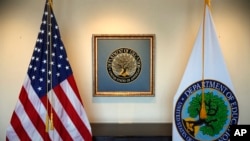
A federal judge in Texas has blocked a regulatory provision targeting for-profit colleges that was scheduled to take effect in July 2024.
Times Higher Education reports that the rule, which would affect student loans, was challenged by for-profit institutions. (June 2024)












